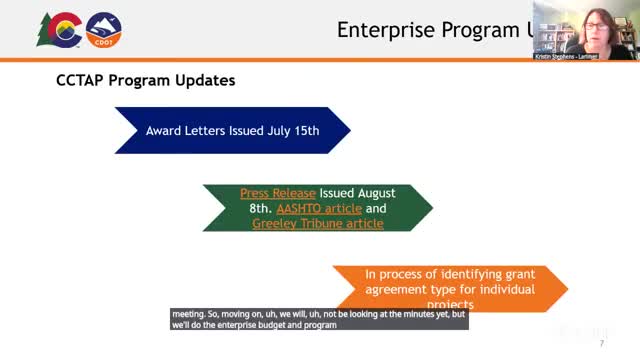Nonattainment-area air pollution mitigation enterprise board approves draft FY27 budget, affirms grant awards and dashboard plans
Get AI-powered insights, summaries, and transcripts
Subscribe
Summary
The Nonattainment Area Air Pollution Mitigation Enterprise board approved a draft fiscal 2027 budget 4–0, discussed previously awarded grants totaling $17.3 million to 11 grantees, received a legal update on an appeal in the Americans for Prosperity challenge to SB 21-260, and reviewed plans for a public accountability dashboard.
The Nonattainment Area Air Pollution Mitigation (NAPMI) Enterprise Board of Directors approved a draft fiscal year 2027 budget on a 4–0 vote and discussed program updates including grant awards, a legal update on ongoing litigation, and plans for a public accountability dashboard.
The action took place during the board’s regular meeting when Vice Chair Lynn Baca joined and the board attained quorum, after which the board moved to consider the draft FY27 budget. Darius, an enterprise staff member who presented the budget, told the board that anticipated revenue for FY27 is about $17,400,000 and that, after administrative, operating and contingency allocations, roughly $16,800,000 would be available for programs and projects.
The draft budget proposes a split of funds following the board’s 10‑year plan: a 70/30 program split with approximately $5,040,000 allocated to the Community Clean Transportation Assistance Program (CTAP) and about $11,800,000 set aside for a future large infrastructure grant program. Darius said staff recommends $200,000 for staff compensation (up from about $100,000 previously) to support ramping project administration, a $200,000 board contingency reserve, and a new $150,000 central services cost allocation intended to cover indirect costs such as IT and other shared services. Administration and operating totals were presented as approximately $377,500.
Board members asked for clarifications on several items. Director Furco said the staff compensation line should be monitored and revisited if administrative workload increases as projects move into implementation. Vice Chair Lynn Baca asked whether the $200,000 contingency is adequate for retainage or to cover project overruns; staff responded the contingency has not been used historically and that any use of the contingency would require a board decision and likely come from the programming and projects pool. Director Sunica asked whether contingency funds roll forward; staff said unused contingency automatically rolls into programming and projects in subsequent budgets.
Darius also reviewed recent program activity. He reported that staff issued award letters to 11 grantees totaling $17,300,000 for the CTAP program; those awards reflect program funds from fiscal years 2023, 2024 and 2025. He noted national press recognition, including an AASHTO article and coverage in the Greeley Tribune, and said award letters were issued in mid‑August and remain available on the enterprise website.
On legal matters, Darius told the board that the Colorado Supreme Court declined to take up an appeal by the group Americans for Prosperity of the state appellate court ruling that had favored the enterprise in a challenge to the enabling legislation (identified in the meeting as SB 21‑260). He said Americans for Prosperity may still appeal to the U.S. Supreme Court and that staff can connect board members with the Office of the Attorney General for more detail.
Board members reviewed a proposed public accountability dashboard that staff has been developing in Power BI to meet the enterprise’s transparency requirements. The mockup shows awarded projects on an interactive map, award amounts, project types, and estimated reductions in ozone precursors (for example NOx and VOCs) expressed as kilograms per day. Directors asked for dashboard items that would make impacts clearer to community audiences — for example, narrative summaries or local indicators such as participation counts, connectivity or safety outcomes — and staff said they would work with project sponsors to capture measurable and narrative highlights and return to the board with a demonstration before making the dashboard public.
A motion to approve the draft FY27 budget was made and seconded; the vote passed 4–0. The board will revisit a final budget early next year (staff indicated a vote on a more complete budget is expected in February or March) and will submit the final enterprise budget as required to the Office of State Planning and Budget and share it with the Transportation Commission as part of CDOT’s packet. Staff said the next NAPMI board meeting is scheduled for Dec. 4, when the board also expects to consider the enterprise annual report for calendar year 2025 and receive open‑meetings training from the Office of the Attorney General.
The board’s discussion focused on ensuring administrative capacity as projects shift from award to implementation, preserving the board’s ability to respond to contingencies, and improving public transparency through the planned dashboard. No other formal actions were taken at the meeting.
